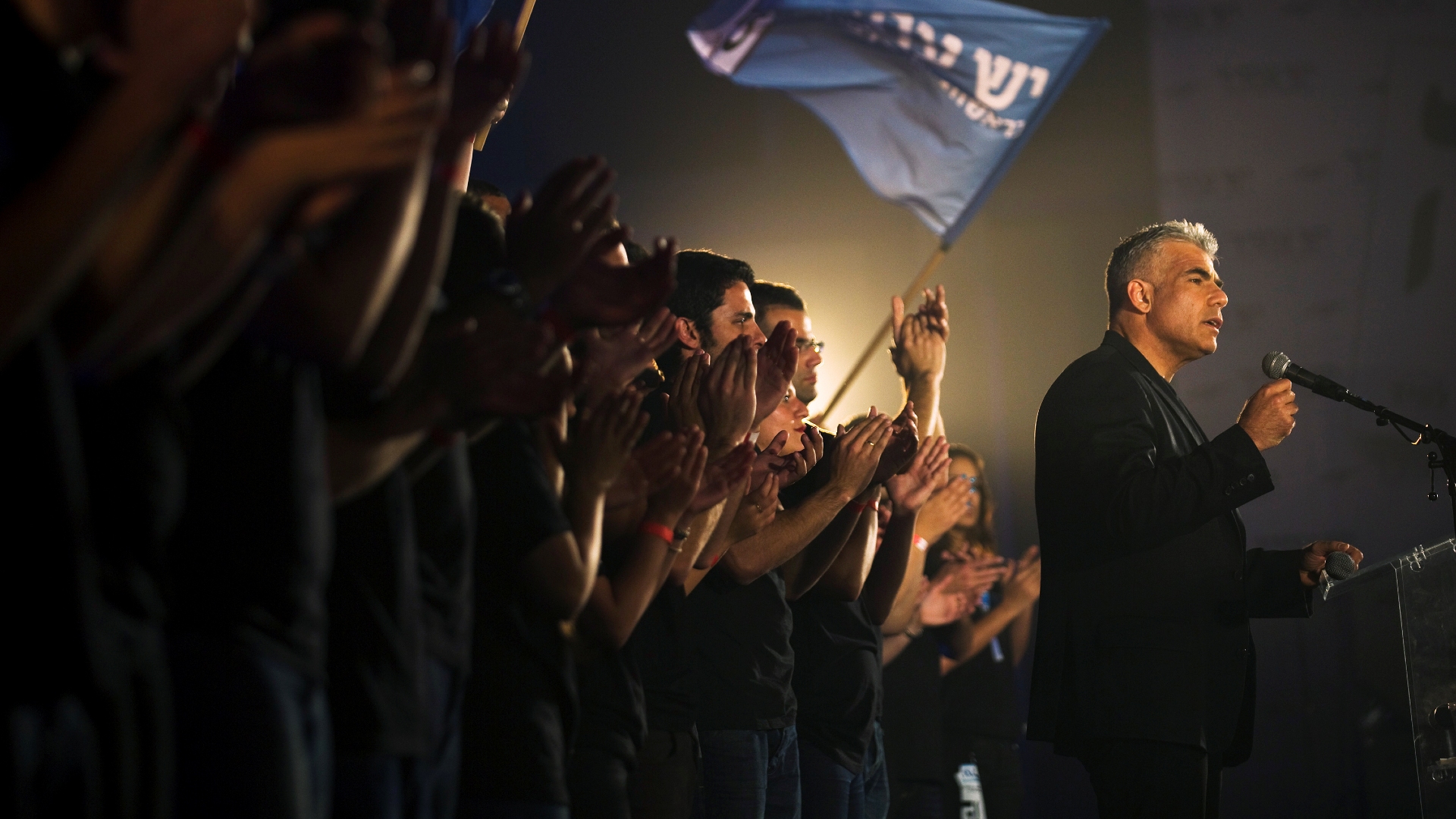
Benjamin Netanyahu greets his supporters after the Israeli parliamentary elections in Jerusalem, March 24, 2021. /Xinhua
Benjamin Netanyahu greets his supporters after the Israeli parliamentary elections in Jerusalem, March 24, 2021. /Xinhua
Editor's note: Guy Burton is a visiting fellow at Lancaster University and adjunct professor at Vesalius College, Brussels. The article reflects the author's opinions and not necessarily the views of CGTN.
After Israel's fourth election in two years, the outcome is once again uncertainty. No party has won a majority, although Prime Minister Benjamin Netanyahu's right-wing Likud party is the largest in the Knesset (Parliament), winning around 30 of the 120 seats, followed by the more centrist Yesh Atid party led by Yair Lapid, which picked up around 18 seats. No clear victor has emerged to win at least 61 lawmakers in Israel's elections, with nearly 90 percent of ballots counted in Tuesday's vote.
Overall, parties on the right of the political spectrum win the most seats, with the centrist and leftist parties and Arab parties, picking up fewer.
That the political right – and Netanyahu – fared so well may be partly due to the turnaround in Israel's fortunes regarding the COVID-19 pandemic in recent months.
Since the start of the year, Israel has had one of the more successful vaccination programs in the world. In relative terms it has inoculated more of its population, as measured in the number of vaccinations per 100 people – although Israel has also been criticized for not providing sufficient vaccinations to the Palestinian population in the territory it occupies. Of those within the Green Line (i.e., not counting occupied territory), around half the population is reported to have received a dose and the virus reproduction rate has been falling since the start of the year.
The vaccination drive should help mitigate the country's economic situation. According to the IMF, Israel's economy contracted by 6 percent in 2020. Unemployment, measured in its broadest sense, is currently around 18 percent, according to the Central Bureau of Statistics.
The upbeat news may have helped muffled some of the public scrutiny in relation to Netanyahu's own personal problems. He is currently on trial for breach of trust, accepting bribes and fraud.
Given Netanyahu's relative strong showing, he will be in the driving seat when it comes to initiating talks to form the next government in the coming days and weeks. At the same time, Netanyahu cannot be sure that he will remain as prime minister.

Some Israelis have held regular demonstrations against Benjamin Netanyahu. /Reuters/AMMAR AWAD
Some Israelis have held regular demonstrations against Benjamin Netanyahu. /Reuters/AMMAR AWAD
Netanyahu can count on the support of some of the parties in the right-wing bloc, especially the religious Orthodox parties. But where he will face problems is from other right-wing leaders who do not want to see him return as prime minister. They include former allies, including Gideon Saar, who split from Likud and set up his own New Hope party, as well as Avigdor Liberman and his Yisrael Beitenu party.
In contrast to Saar and Liberman, another former Netanyahu ally, Naftali Bennett and the Yamina party have indicated greater flexibility. The absence of explicit opposition has propelled him into the role of kingmaker when the final results come through in the next few days and the politicians begin negotiations to form a governing coalition.
Besides Netanyahu, the other main contender for prime minister is Yair Lapid. Lapid may have a harder job putting a coalition together, given the greater assortment of parties he would need to win over. Among them would include his former partner in the Blue and White alliance, Benny Gantz, who he abandoned last year when Gantz reneged on a promise to oppose Netanyahu by establishing a "national unity" government. The experience was an unhappy one. Not only was little trust between the two, but Gantz saw public support collapsed. That his party is on course to win around eight seats is therefore seen as a welcome improvement.

Yair Lapid, head of Yesh Atid party, could place second in the election. /Reuters/Amir Cohen
Yair Lapid, head of Yesh Atid party, could place second in the election. /Reuters/Amir Cohen
Besides Gantz, Lapid would also have to reach out to other centrist and moderately left parties like Meretz and Labor. Like Gantz, their individual share of the vote held up, but complicating matters for Lapid may be the relative lack of cooperation between these parties as there is on the right of the political spectrum.
That will also be the case with the Arab parties. In 2020 the four parties formed a relatively cohesive bloc for the 20 percent of the Israeli population that is Arab. They formed the third largest bloc in the Knesset and were touted as a potential partner in a non-Netanyahu government after the last election, their influence has waned this time around.
However, this time around the performance has been more disappointing. The bloc fractured when the conservative Raam party led by Mansour Abbas broke from the other three more leftist parties. Abbas tried to challenge the prevailing isolationist approach among the Arab parties by building relations with Netanyahu and the right to attract greater public funds for Arab communities.

Benny Gantz, the main leader of the Blue and White party and a former chief of the Israeli forces, speaks to supporters in Tel Aviv, Israel, April 9, 2019. /Xinhua
Benny Gantz, the main leader of the Blue and White party and a former chief of the Israeli forces, speaks to supporters in Tel Aviv, Israel, April 9, 2019. /Xinhua
Netanyahu sensed an opportunity. Abbas's split highlighted a growing frustration among the Arab Israeli population regarding both the Joint List's performance and effectiveness and a lack of alternatives, including the absence of attention paid by Labor and Meretz. He therefore invested time campaigning in Arab towns and cities, which was in stark contrast to previous elections, where he used the specter of Arabs voting to exhort his Jewish supporters to go to the polls.
Netanyahu's efforts seem to have worked. For one, Arab turnout was down this time around, only reaching 20 percent by mid-afternoon on election day. For another, the lower turnout likely means less Arab seats in the Knesset: the remaining Joint List is expected to win eight while Raam is unlikely to pass the electoral threshold.
(If you want to contribute and have specific expertise, please contact us at opinions@cgtn.com.)

